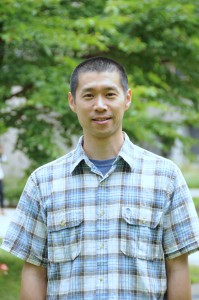TIRF: What were the main findings of your doctoral study in a few sentences?
Dr. Machida: My dissertation research focused on English anxiety among Japanese elementary school teachers, who had just began to teach students English after a curriculum change. There were three main findings in my study.
First, most teachers were anxious about English. The data showed that 77.4% of teachers were anxious about their own English proficiency, and 90.2% of them were anxious about teaching English. The sources of anxiety included the teachers’ lack of confidence in English communication and their lack of experience and training for teaching English. Furthermore, most elementary school teachers reported themselves as being at a beginning level of English proficiency.
Second, teachers experienced two phases of anxiety. Their first-phase anxiety stemmed from their unfamiliarity with English language education. Their second-phase anxiety stemmed from their struggles with English communication with assistant native English-speaking teachers.
Third, no universal strategies for coping with anxiety were found among these Japanese elementary school teachers. Although some teachers started to deal with their anxiety, it seemed to be impossible for all teachers to create their own coping strategies because they were very busy. Thus, my recommendation is that each city’s board of education should take the lead in helping teachers develop such strategies.
TIRF: Where are you currently working and what does your position involve?
Dr. Machida: I am currently working as an Assistant Professor in the English for Academic Purposes Program at Akita International University, which is a public university located in northeastern Japan. I am mainly teaching Academic Writing courses for freshmen and seniors. In addition, in collaboration with the Akita Prefectural Board of Education, I plan and teach in-service training courses for local English teachers from elementary to high school levels. This is a great opportunity for me to implement what I have learned from my dissertation research. I am currently planning an intensive summer training course for elementary school teachers to decrease their foreign language anxiety.
TIRF: What plans do you have for future research and how did your dissertation influence them?
Dr. Machida: I have several plans for my future research. I would like to investigate co-teaching between a nonnative English teacher and a native English-speaking teacher. A quest for an effective teaching style and the roles of teachers would be possible topics for my future studies. Co-teaching has been widely adopted in most schools from elementary through high school in Japan. However, co-teaching between native and nonnative teachers does not seem to work well due to a lack of mutual communication.
Understanding Japanese teachers’ anxiety might help to answer some questions about the miscommunication between native- and non-native-speaking teaching partners. Thus, providing nonnative teachers with professional development opportunities is very important to help them lessen their anxiety. I also think that nonnative teachers need to learn how to effectively work with native English teachers through diminishing their English anxiety from a practical point of view. I will continue to explore English anxiety as my lifelong research theme.
TIRF: What did receiving the TIRF Doctoral Dissertation Grant mean to you?
Dr. Machida: Receiving the TIRF Doctoral Dissertation Grant meant a great deal to me. It gave me confidence about my research and helped me complete my investigation in Japan without any financial worries. Due to the competitiveness of TIRF’s DDG program, I did not think that I would receive the grant. Thus, I had confidence in myself because the TIRF reviewers thought that my research was worth supporting. My advisor, Dr. Walsh, encouraged me to complete my doctoral program with his full support when I got the TIRF DGG. And of course, TIRF’s financial support was extremely important. I needed to travel to Japan to visit many elementary schools to collect data. The TIRF grant enabled me to complete my six weeks of data collection in Japan. Without the grant, I would not have been able to finish my whole research plan.
TIRF: What advice would you give people who are just beginning their doctoral research?
Dr. Machida: Patience and preparation are keys for successful completion of your doctoral research. Unlike writing research papers, conducting doctoral research involves collaboration and cooperation with other people, such as interviewees, office clerks, and professors. You cannot control their work. In my case, I waited for three months to get research permission from my university and two months to get the “go-ahead” from gatekeepers for interviews. Typically it takes substantial time to do your research. However, during the waiting time, you should prepare yourself to better conduct your study. While I was waiting, I revised my research questionnaire and practiced how to conduct interviews, all of which paid off. Sometimes you may be nervous about the delay of your research, but you should be patient and prepare yourself for your next step to complete your doctoral research successfully.
TIRF: What would you say to someone who is considering donating to TIRF?
Dr. Machida: Your gift will make a tremendous difference. I really appreciate the people who supported me in completing my dissertation. Without your donations to TIRF, I could not have finished my PhD program. There are many young researchers like me who want to solve the problems of teaching and learning English in ESL/EFL contexts. With the TIRF DDG, I investigated English anxiety among Japanese elementary school teachers. Having completed my PhD program, I am currently helping local Japanese teachers who teach English to students. Thus your contributions will help children learn English in the future. Although you may not see a direct connection between your gift to TIRF and its benefits, your support will be very valuable for years to come.


